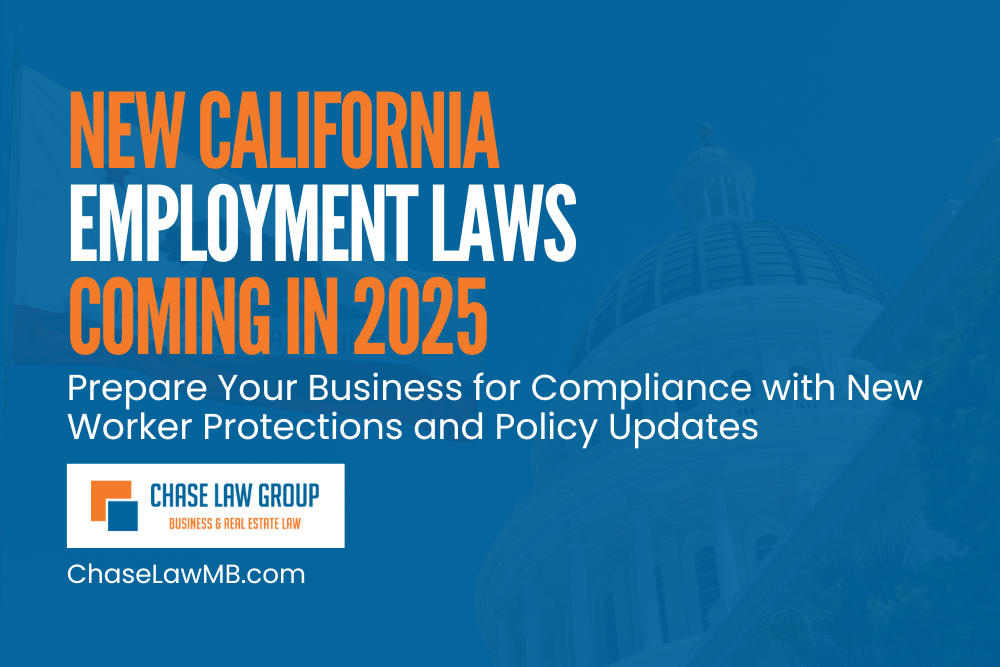New California Employment Laws Coming in 2025
By Admin October 29, 2024 Category: Employment Tags: business attorney business law CA employers CA employment 2025 chase law manhattan beach deann chase employee rights employment attorney employment compliance employment law freelancer protection intersectional rights labor law update los angeles business attorney paid leave sick leave small business law Worker Rights Workplace Laws

Governor Newsom recently signed into law several new California employment laws that come into effect on January 1, 2025. Below are these new laws.
Prohibition of Requiring Employees to Attend a Meeting Where Religious or Political Opinions Are To Be Discussed
Under SB 399, the “California Worker Freedom from Employer Intimidation Act” (subject to limited exceptions) prohibits employers from taking or threatening to take adverse action against an employee who declines to attend a meeting or participate in, receive, or listen to its opinion on “religious” or “political” matters, which includes union organizing. Violations are subject to a civil penalty and the act will be enforced by the Labor Commissioner or alternatively, a civil action.
New Protections for Freelance Workers
SB 998 called the “Freelance Worker Protection Act,” creates protections for independent contractors in the private sector who are paid at least $250 for their services. The bill requires that workers be paid on or before the date in their contract or in the absence of a contractual date, no later than 30 days after completion of services and prohibits conditioning payment on accepting less compensation or making certain changes to the contract. It also requires a written contract between the hiring party and the worker, which the hiring party must retain for four years. The hiring party is also prohibited from taking adverse action against a worker for exercising their rights under this bill and either the worker or a public prosecutor may bring a civil action as enforcement.
Driver’s License Requirement Prohibited in Job Postings
The passage of SB 1100 now makes it an unlawful employment practice for employers to state “in a job advertisement, posting, application, or other material” that job applicants must possess a driver’s license. There is an exception where driving is one of the job functions of the position, and using an alternative form of transportation would not be comparable to driving in terms of travel time or cost to the employer.
Protection for Intersectionality of Protected Characteristics
Governor Newsom signed SB 1137, which provides clarification that the Unruh Civil Rights Act, the Education Code, and the California Fair Employment and Housing Act (FEHA) prohibit discrimination not only on the basis of individual protected traits, but also on the basis of the intersectionality of two or more protected traits. While California laws have long prohibited discrimination and harassment on the basis of protected characteristics — such as race, gender, age, disability and sexual orientation — they now also apply to intersectional identities, where two or more of the characteristics result in a unique form of discrimination. Pursuant to SB 1137, a party may be required to establish whether the discrimination or harassment occurred on the basis of a combination of factors, rather than a single protected characteristic.
Employees Cannot be Required to Use Vacation Before Receiving Paid Family Leave Benefits
AB 2123 establishes that employers will no longer be allowed to require employees to exhaust up to two weeks of accrued vacation before receiving paid family leave (PFL) benefits. The state provides PFL benefits to eligible employees to care for seriously ill family members, bond with new children, or assist when a military family member is deployed to a foreign country.
Expansion of Paid Sick Leave Rights
AB 2499 amends the statewide paid sick leave law, also known as the Healthy Workplaces Healthy Families Act. The bill expands the qualifications for “safe” leave, allowing paid sick leave when an employee’s family member is a victim. Under the amendments, paid sick leave will continue to be available if the individual is a victim of domestic violence, sexual assault, or stalking, but will now also cover victims of bodily injury or death by a third party to another individual, victims of any dangerous weapon with respect to another, and victims of reasonably perceived or actual threat of physical injury or death to another individual. In addition, the unpaid leave protections for victims are now a part of California’s FEHA and will be enforced by the California Civil Rights Department.
If you have any questions about these new laws and/or the impact on your company, contact our employment attorney Scott Liner at [email protected].
Take Action for 2025: Update Your Employee Handbook Today
WWW.CHASELAWMB.COM
Contact Chase Law Group
Please note that this article is for informational purposes only and should not be considered legal advice and does constitute an attorney-client relationship. It is recommended to consult with an attorney and your insurance carrier directly for specific guidance pertaining to your business and its practices.

